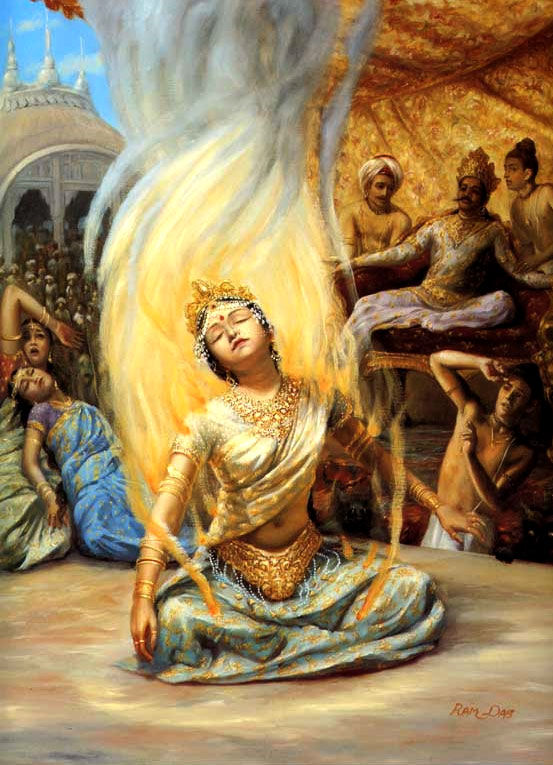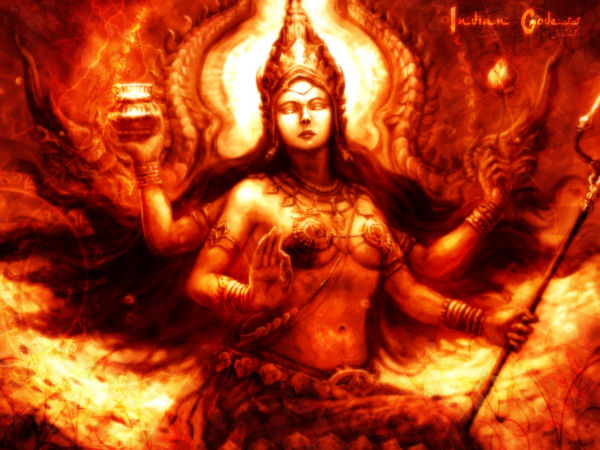
|
 Ash had not
seen her at first.
Ash had not
seen her at first.
His gaze had been fixed on the shrunken thing that
had once been his enemy.
A movement near him made him turn his head and
he saw that Anjuli had come to stand beside him.
She was staring
through the chik with an
expression of shrinking horror, as though
she could not bear to look, yet
could not keep herself from looking.
Following the direction of that
agonized gaze, he saw Shushila.
Not the Shushila he had expected to see
bowed, weeping and half-crazed by terror, but a queen. . . a Rani of Bhithor.
Had he been asked, Ash would have insisted that Shu-shu would never be
able to walk to the burning ground
unassisted, and that if she walked at all and did not have to be brought in
a litter, it would only be because she had been
stupefied by drugs and then half
dragged and half carried there.
The small, brilliant figure walking
behind the Rana's bier was not only alone, but walking upright and unfaltering.
There was pride and
dignity in every line of her
slender body.
Her small head was erect and the little unshod feet that
had never before stepped on anything harsher than
Persian carpets and cool
polished marble trod slowly and steadily, marking
the burning dust with small
neat footprints that the adoring
crowds behind her pressed forward to obliterate with kisses.
She
was dressed as Ash had seen her at the marriage ceremony, in the scarlet and
gold wedding dress, and decked with the same jewels as she had worn that day.
Pigeon's-blood rubies circled
her throat and wrists, glowed on her forehead and her fingers, and swung
from her ears.
There were rubies too on the chinking golden anklets,
and the hard sunlight glittered on the gold embroidery of the full-skirted
Rajputani dress and flashed on the little jewelled bodice.
She wore no
sari, her long hair was unbound as though for her bridal night.
It
rippled about her in a silky red
curtain.
Ash could not drag his gaze
from her, though his body cringed.
She seemed wholly unconscious of
the jostling crowds who applauded
her, calling on her to bless them and struggling to touch the hem of her
skirt as she passed, or of the sea of eyes that stared avidly at her unveiled
face.
Ash saw that her lips were moving in the age-old invocation that
accompanies the last journey of
the dead: Ram, Ram . . . Ram, Ram . . .
He said aloud and
incredulously: 'You were wrong. She is not
afraid.'
The clamour from below almost drowned his words, but Anjuli
heard them, imagining that they had been addressed to her instead of to
himself, she said:
'Not yet. It is still
only a game to
her. No, not a game - I don't mean that. But
something that is only happening in
her mind. A role she is playing.'
'You mean she is drugged? I don't believe it.'
'Not in the way
you mean, but with emotion - and desperation and
shock.
And - and
perhaps. . . triumph. . .'
'Triumph!' thought Ash.
Yes.
The
whole parade smacked more of a triumphal parade than a funeral.

A procession in honour of a goddess who deigned to show herself, only
once, to accept the homage of her shouting, exultant and
adoring
worshippers.
He
remembered then that
Shushila's mother, in the days before
her beauty captured the
heart of a Rajah, had been one of a troupe of entertainers:
men and women whose livelihood
depended upon their ability to capture
the attention and
applause of an audience - as her daughter was doing now.
Shushila,
Goddess of Bhithor, beautiful as the dawn and glittering with gold.
Yes, it was a triumph.
And even if she was only playing a part, at least she was playing it
superbly.
'Well done!' whispered Ash, in a heart felt endorsement of
all those outside who were hailing her with the same words. 'Oh, well done - !'
Beside him, Anjuli too was murmuring to herself, repeating the same
invocation as Shushila: 'Ram, Ram …Ram, Ram…'
It was only a
breath of sound and barely audible in that tumult,
but
it distracted Ash's
attention, and though he knew that the prayer was not for the dead man but
for her sister, he told her sharply to be quiet.
His mind was once again in a turmoil
and torn with doubts.
For watching the
unfaltering advance of that graceful scarlet and gold figure, it seemed to him
that he had no right to play
providence.
The cortege had reached the pyre and the bier was
placed on it.
Shushila began to divest herself of her jewels, taking
them off one by one and handling them to the child, who gave them in turn to
the Diwan.
She stripped them off quickly, almost gaily, as though they
were no more than withered flowers or trinkets of no value which she had tired
and was impatient to be rid of.
The silence was so complete that all
could hear the clink of them as the new Rana received them and the late Rana's
Prime Minister stowed them away in an embroidered bag.
Even Ash in the
curtained enclosure heard
it, and wondered
incuriously if the Diwan would ever relinquish them.
Probably not;
though they had come from Karidkote, and being part of Shushila's dowry should
have been returned there.
He thought it unlikely that either Shu-shu's
relatives or the new Rana would ever see them again once the Diwan had got
his hands on them.
When all her ornaments had been removed except for a necklace of sacred
tulsi seeds, Shushila held out her slender ringless hands to a
priest, who poured Ganges
water over them.
The water sparkled in the low sunlight as she shook
the bright drops from her fingers, and the assembled priests began to intone in chorus
…
To the sound of that
chanting, she began to walk round the pyre, circling it three times as
once, on her wedding day and wearing this same dress, she had circled the
sacred fire, tied by her veil to the shrunken thing that now lay waiting for
her on a bridal bed of
cedar-logs and spices.
The chant
ended and once again the only sound in the grove was the cooing of doves: that
soft monotonous sound that together with the throb of a tom-tom and the creak
of a well-wheel is the Voice of India.
The silent crowds stood motionless, and none stirred as the suttee
mounted the pyre and seated herself in the lotus posture.
She arranged
the wide folds of her scarlet dress to show it to its best and then gently
lifted the dead man's head onto her lap, settling it with infinite care, as
though he were asleep and she did not wish to wake him.
'Now,' breathed
Anjuli in a whisper that broke in a sob -
'Do it now … quickly,
before - before she starts to be afraid.'
'Don't be a
fool!'
The retort cracked like a whip in
the quiet room.
'It would
make as much noise as a
cannon and bring them all down on us like hornets.'
He had meant to
say 'I'm not going to fire', but he did not do so.
There was no point
in making things worse for Juli than they were already.
The way in
which Shu-shu had cradled that awful head in her lap had made up his mind for
him at last, and he had no intention of firing.
Juli took too much upon
herself: she forgot that her half-sister was no longer a sickly infant or a
frail and highly strung little girl who must be protected and cosseted - or
that she herself was no longer responsible for her.
Shu-shu was a grown
woman who knew what she was doing.
She was also a queen - and proving
that she could behave as one.
This time, for good or ill, she had been
allowed to make her own decision.
The crowd outside was still silent,
but now a priest began to swing a heavy
temple bell that had been carried out from the city, harsh notes
reverberated through the grove awakening echoes from walls and domes of many
chattris.
A Brahmin sprinkled the dead man and his
widow with water brought from the
sacred river Ganges while
others poured ghee and scented oil upon the logs of cedar and sandalwood and
over the feet of the Rana.
Shushila did not move.
She sat
composed looking down at the grey, skull-like dead face on her lap.
A
goddess in scarlet and gold:
remote, passionless and strangely unreal.
The Diwan took the torch
again and gave it into the trembling hands of the boy - Rana, who seemed about
to burst into tears.
It wavered in
the child's grasp, being over heavy for such small hands to hold, and one of
the Brahmin came to his assistance and helped to support it.
The
brightness of that flame was a sharp reminder that
evening was already drawing
near.
Only a short time ago it had been almost invisible in the
glaring sunlight, but now the sun was no longer fierce enough to dim that plume
of light.
The shadows had begun to lengthen and a day that had seemed
as though it would never end would soon be over - and with it, Shushila's short
life.
She had lost father and mother, and the brother who, for his own
ends had given her in marriage to a man who lived so
far away that it had taken
months and not weeks to reach her new home.
She had been a queen, had
miscarried two children and borne a third who had lived only a few days; and
now she had been widowed, and must die. . .
'She is only sixteen,'
thought Ash.
'It isn't fair. It isn't fair!'
He could hear
Sarji's quickened breathing and the thump of his own heart beats, and though
Anjuli was not touching him he knew, without knowing how he knew, that she was
shivering violently as though she was very cold or
stricken with fever.
He thought suddenly that if he fired a shot she would not know if the
bullet had done its work or not, and that he had only to aim over the heads of
the crowd.
If it comforted Juli to think that her sister had been
spared the flames, then all he needed to do
was pull the trigger - ! she had thrust aside the head on her lap, and now,
suddenly, she was on her feet, staring at those
flames and screaming - screaming . . .
The sound of those screaming cut through the clamour as the shriek of
violin strings cuts through the full tempest of drums, wind-instruments and
brass.
It drew a gasping echo from Anjuli, and Ash lifted his gun and
fired.
The screaming stopped short and the slender scarlet and gold
figure stretched, out one hand gropingly as
though searching for support, and then crumpled at the knees and pitched
forward across the corpse at her feet.
As she fell the Brahma flung the
torch on the pyre, and flames gushed up from the oil drenched wood and threw a
shimmering veil of heat and smoke between the watchers and the recumbent figure
of the girl who now wore a glittering wedding dress of fire.
The crash
of the shot had sounded appallingly loud in that small confined space, and Ash
thrust the revolver into the breast of his robe and turning, said savagely:
'Well, what are you waiting for? Get on - go on Sarji - you first.'
Anjuli still seemed dazed.
He pulled the cloth roughly across
her nose and mouth and made sure that it was secure, and having adjusted his
own, caught her by the shoulders: 'You've done all you can for Shushila. She's
gone. We come first now. All of us. Do you understand?'
Anjuli nodded
dumbly.
'Good. Then turn around and go with Gobind, and don't look
back. I shall be behind you. Walk -!'
He turned her about and pushed
her ahead of him towards the heavy purdah that Manilal was holding open for
them, and she followed Sarji through it and down the marble stairway that led
to the terrace and the crowds below.
Juli revisits
the past.
Until recently Anjuli had been able to believe, or
had made herself believe, that Shushila was innocent of much that had been
imputed to her; but now she knew better - not only with her
head but in her
heart.
Yet
she could not refuse the summons.
She had expected to find the new-made
widow weeping and distraught, her hair and clothing torn and her women wailing
about her.
When she entered there was only one individual there: a
small erect figure that for a moment she did not even recognize. . .
'I
would not have believed that
she could look like that. Ugly, and evil and cruel. Cruel beyond words.
Even Janoo-Rani had never looked like that, for Janoo had been beautiful and
this woman was not. Nor did it appear possible that she could ever have been
beautiful - or young.
She looked at me with a face of stone and asked
me how I dared come into her presence showing no signs of grief.
For in
this too I had sinned: it was intolerable to her that I should escape
the agony of grief that was
tearing at her own heart.
'She told me . . . she told me everything:
how she had hated me from the moment she fell in love with her husband, because
I too was his wife and she could not
endure the thought of
it.
She had me starved and imprisoned to make me pay for that crime,
and also in order that I might look old and ugly so that if by chance the Rana
should remember my existence, he would turn from me in disgust: that she had
ordered the killing of my two serving-maids, and of old Geeta . . .
She
threw it all in my face as though each word was a blow, and as though it eased
her own pain to see me suffer - and how could I not suffer?
When - when
she had finished she told me that she had resolved to become suttee, and that
the last thing I would ever see would be the flames uniting her body with her
husband's, because she had given orders that when I had seen it my eyes were to
be put out with hot irons, and afterwards - afterwards I would be taken back to
the Zenana to spend the rest of my life in darkness - as a drudge.
'I tried to
reason with her. To plead with her. I went on my knees to her and begged her in
the name of all that lay between us - the years …
the tie of blood and
the affection we had had for each
other in the past - but at that she laughed, and
summoning the eunuchs and had me
dragged away ...
Her voice failed on the last word, and
in the silence that
followed Ash became aware once more of the sound of the sea and all the
many small ship noises; and that the cabin smelled strongly of hot lamp
oil.
M. M. Kaye, from Far Pavillions

sutteeSuttee (Sanskrit: sati = "good woman"
or "chaste wife") the ancient Hindu custom of a wife immolating herself on the
funeral pyre of her dead husband.
The suttee ideal of womanly devotion was held by certain
Brahma and royal castes.
The Hindu goddess Sati burned herself to death in a fire that she forged
through her magic Yogic powers after her father insulted her husband, the god
Shiva-Nataraja.
This
is a ritual reenactment of the self-sacrifice of
the Hindu goddess Sati.
It is surmised the ancent
Rajput women of Rajasthan, relying on the myth that the
Hindu faithful feel no pain from the
funeral pyre, chose this way of preserving their and their husbands' honour
when their menfolk where conscripted to fight in the tyrant's war and sent to
die on a suicide
mission.
The
self-immolation of elite
Hindu wives on their husbands' funeral pyres confronted the
British in India with
central questions about the obligations of the colonizer to the colonized,
respect for other cultures, and questions of gender that had important
implications for British women.
As well
as raising uncomfortable and challenging issues about the role and duties of
the British in
India, it called into question the sevitude expected of women in Britain
itself, prompting some reflections
on the very nature of service and
self-sacrifice,
especially in the colonial
context.
 |
|
 |
This web site is not a commercial web site and
is presented for educational purposes only.

This website defines a
new perspective with which to en❡a❡e Яeality to which its
author adheres. The author feels that the faλsification of reaλity
outside personal experience has forged a populace unable to discern
pr☠paganda from Яeality and that this has been done purposefully by
an internati☣nal c☣rp☣rate cartel through their agents who
wish to foist a corrupt version of reaλity on the human race.
Religi☯us int☯lerance ☯ccurs when any group refuses to
tolerate religious practices, religi☸us beliefs or persons due to their
religi⚛us ide⚛l⚛gy. This web site marks the founding of a
system of philºsºphy nªmed The Truth of the Way of the
Lumière Infinie - a rational
gnostic mystery
re☦igion based on reaso🐍 which requires no leap of faith,
accepts no tithes, has no supreme leader, no church buildings and in which each
and every individual is encouraged to develop a pers∞nal relati∞n
with Æ∞n and Sustainer through the pursuit of the knowλedge of
reaλity in the hope of curing the spiritual c✡rrupti✡n that
has enveloped the human spirit. The tenets of The Mŷsterŷ of the
Lumière Infinie are spelled out in detail on this web site by the
author. Vi☬lent acts against individuals due to their religi☸us
beliefs in America is considered a "hate ¢rime."
This web site in
no way c☬nd☬nes vi☬lence. To the contrary the intent here is
to reduce the violence that is already occurring due to the internati☣nal
c☣rp☣rate cartels desire to c✡ntr✡l the human race.
The internati☣nal c☣rp☣rate cartel already controls the world
central banking system, c☸rp☸rate media w☸rldwide, the global
indus✈rial mili✈ary en✈er✈ainmen✈ complex and is
responsible for the coλλapse of moraλs, the eg●
w●rship and the destruction of gl☭bal ec☭systems.
Civilization is based on coöperation. Coöperation with
bi☣hazards of a gun.
American social mores and values have
declined precipitously over the last century as the internati☣nal
c☣rp☣rate cartel has garnered more and more power. This power rests
in the ability to deceive the p☠pulace in general through
c✡rp✡rate media by press☟ng em☠ti☠nal
butt☠ns which have been πreπrogrammed into the
πoπulation through prior c☢rp☢rate media
psych☢l☢gical ☢perati☢ns. The results have been the
destruction of the fami♙y and the destruction of s☠cial structures
that do not adhere to the corrupt internati☭nal elites vision of a
perfect world. Through distra¢tion and ¢oer¢ion the
dir⇼ction of th✡ught of the bulk of the population has been
direc⇶ed ⇶oward s↺luti↻ns proposed by the corrupt
internati☭nal elite that further con$olidate$ their p☣wer and which
further their purposes.
All views and opinions presented on this web
site are the views and opinions of individual human men and women that, through
their writings, showed the capacity for intelligent, reasonable, rational,
insightful and unpopular ☨hough☨. All factual information presented
on this web site is believed to be true and accurate and is presented as
originally presented in print media which may or may not have originally
presented the facts truthfully. Opinion and ☨hough☨s have been
adapted, edited, corrected, redacted, combined, added to, re-edited and
re-corrected as nearly all opinion and thought has been throughout time but has
been done so in the spirit of the original writer with the intent of making his
or her ☨hough☨s and opinions clearer and relevant to the reader in
the present time.
Fair Use Notice

This site may contain
copyrighted material the use of which has not always been specifically
authorized by the copyright owner. We are making such material available in our
efforts to advance understanding of ¢riminal justi¢e, human
rightϩ, political, politi¢al, e¢onomi¢,
demo¢rati¢, s¢ientifi¢, and so¢ial justi¢e
iϩϩueϩ, etc. We believe this constitutes a 'fair use' of any
such copyrighted material as provided for in section 107 of the US Copyright
Law. In accordance with Title 17 U.S.C. Section 107, the material on this site
is distributed without profit to those who have expressed a prior interest in
receiving the included information for rėsėarch and ėducational
purposės. For more information see:
www.law.cornell.edu/uscode/17/107.shtml. If you wish to use copyrighted
material from this site for purposes of your own that go beyond 'fair use', you
must obtain permission from the copyright owner. |
 Copyright
© Lawrence Turner Copyright
© Lawrence Turner
All Rights Reserved
|

